- Home
- Will Hobbs
Wild Man Island
Wild Man Island Read online
Wild Man Island
Will Hobbs
to Elise Howard,
my wonderful editor;
to Barbara Fitzsimmons,
inspired art director;
and to Josh Weiss,
managing editor extraordinaire
Contents
Map
1
I WAS PUSHING THE LIMITS. My kayak was out in…
2
LONG AFTER THE OTHERS HAD GONE to their tents, I…
3
THE ROAR WAS IN MY EARS as I bounded up…
4
I KEPT THE BOW POINTED TOWARD LAND, kept paddling hard,…
5
ON MY HANDS AND KNEES, I clawed my way out…
6
THE BEAR PAUSED TO SNIFF THE AIR. My heart was…
7
IN SIGHT OF THE CREEK, I found a hole in…
8
FOR TWO MORE DAYS I shivered in the rain and…
9
I SNAKED MY WAY THROUGH devil’s club to the spot…
10
WHEN I CAME TO, darkness engulfed me. It took a…
11
AS I INSPECTED THE DOG’S EAR, he nuzzled the spear…
12
THE NEWFOUNDLAND WAS FLANKING the broad, swampy meadow, keeping to…
13
MORNING BROUGHT RAIN, cold, hunger, and reality. I hurt too…
14
I AWOKE TO A WILD WIND SWAYING the branches that…
15
WHAT WAS I DOING WRONG? I had the bowstring looped…
16
THE FACT THAT I WASN’T FOLLOWING a single footprint sent…
17
I HEARD A FLUTE. I MUST BE DREAMING, I thought,…
18
I STAYED ALONG THE BACKBONE of the ridge. All the…
19
IT WAS TIME FOR SHAYLA to follow with the kennel…
20
“GRAB THE KENNEL CAGE, ANDY.”
21
THE DOG WHINED AND CRIED and yelped something awful. Before…
22
“JUST KEEP PADDLING, WE’LL GET THERE.”
23
I STRUGGLED WITH MY PADDLE to meet a second wave.
24
THE SAILORS WERE AWFULLY HAPPY I was alive. My name…
Author’s Note
About the Author
Other Books by Will Hobbs
Copyright
About the Publisher
Map
1
I WAS PUSHING THE LIMITS. My kayak was out in front of the others but still within shouting distance. So far they weren’t calling me back.
It was the sixth day, the last full day of our trip, and this was the area where we were supposed to have the best chance of seeing the humpbacks. Gimme a whale, I thought. I’m ready for forty tons of breaching humpback whale just like on the postcards.
My eyes were locked on the horizon. The last thing I expected was action right under my nose. Whooosh! came a fountain of water and an explosion of breath as something huge burst out of the water only a few yards away. There, right next to me, was the head of what might have been a giant seal. Big eyes, little ears, long whiskers—I didn’t know what it was. The animal looked me over for a second, snorted, then slipped back underwater.
“Wow!” I said under my breath. “Come back and give me another look, big fella.”
For a minute, nothing. I was sure it was gone for good when, suddenly, the sea erupted with fountains and whooshes. This time five of the critters were bobbing up and down and snorting. Their large eyes were dark and mischievous. A furry water polo team with attitude, that’s how they struck me.
I waved. In response, they swam straight at me. At the last second, point-blank and enormous, they slipped under my kayak.
When they popped up again, they were back where they had first appeared. Still checking me out, they snorted at me, almost comically. “Cool trick,” I called.
Two, three times, I whacked my paddle on the water, hoping they would repeat their stunt so I could get another close look at them.
Same as before, they headed straight for me. Same as before, they passed right under my kayak.
“Andy!” came a voice from behind, and there was Monica, paddling toward me like there was no tomorrow. A ski racer in the winters, Monica was the trip leader even though she was the younger of our two guides. I was basically in awe of her.
“Stop! Stop!” she cried, as she reached out and grabbed hold of my kayak.
“What’s wrong? I wasn’t doing any—”
“Those are Steller’s sea lions, Andy. They can be dangerous! They weigh close to two thousand pounds. Did they snort at you?”
“It was amazing. They wanted to play.”
“Maybe,” she said, raising her eyebrows, “but they can play rough. They were more like charging you, challenging you. A couple of years ago one of them tipped over a kayak. It happened to one of the other compan—”
Suddenly Monica’s eyes went big, and I saw why. Not very far away, an immense whale was bursting out of the sea. Its enormous white flippers flailed as it rose twisting into the air.
For a second the whale seemed to hang suspended, water streaming off its sides. With a resounding splash, it fell on its back into the sea.
Behind us, cheers went up from the group, and someone hollered, “First whale!”
With a huge smile, Monica reached for my shoulder and gave me a forgiving pat. “Humpback whales, Andy! This is what we came for!”
With a sudden pivot, she sped toward the others.
It was going to take me a while to recover from the sting of Monica’s reprimand. I was fourteen, as young as Adventure Alaska would allow on these trips, and the only kid in the group. For six days, I’d been trying so hard.
As I paddled on, I thought about what Monica had just said, that we’d come for the whales. In my case, that was only partly true.
Mostly I had come all the way from Colorado to Baranof Island to make a pilgrimage. My father had died on Baranof. Of course, Monica didn’t know anything about that.
A few minutes later, with all seven kayaks paddling together, the group witnessed a second breach, and then a third. A little while after that, two humpbacks at once rocketed out of the sea.
“Okay, guys, let’s quit paddling,” Monica instructed. “We’re about as close as we should get. Let’s raft up. Grab on to the kayak next to you.”
She began to tap on the hull of her kayak. “Let’s let them know where we are, so they can steer clear. I’d rather not go airborne on a whale, or find myself underneath one when it falls, thank you very much.”
I started tapping on my hull, and so did the paddlers in the four tandem kayaks. Our other guide, Julia, pointed excitedly to the right, where the seagulls were all worked up about something. Julia was my mother’s age and our naturalist. We watched as the gulls circled, screaming, over a spot suddenly churning with fish. By the hundreds, small silvery herring were leaping out of the water, frantically it seemed, and we soon found out why. “Bubble net!” Julia cried, as four feeding humpbacks in a tight ring, jaws wide open, exploded through the surface.
I was mesmerized. My father had seen this up close, had told my mother all about it. It was on account of my father that Alaska had always been a magic word for me, a powerful magnet. The older I got, the more strongly I’d felt Alaska’s pull.
My father had been convinced that the islands of southeast Alaska were hiding deep, dark secrets from the past. When I was five years old, he died trying to find those secrets.
Flanked by whales breaching in the strait, we paddled across the narrow mouth of Cosmos Cove. Our last campsite was in sight at the foot of the cliff. All my feelings ab
out losing my father, growing up without him, were breaking through the surface.
Two miles. Tonight I would be two miles from Hidden Falls, the place where my father had slipped and fallen. It was less than an hour’s paddle to the south.
My mother and I had thought I would come within twenty miles, not two.
When the group assembled in Sitka I’d found out that our itinerary had changed slightly, on account of the whales. When Monica said that our last camp would be at Cosmos Cove, her words hit me like a thunderbolt. I had known that name for years. It’s where my father should have met the floatplane for the first leg of his journey home.
This close, I would never feel right about it unless I visited the place where my father died. I needed to get to Hidden Falls.
My mother had gone there. A year after it happened, she went to Baranof Island and Hidden Falls. She left a small carving there. My father had made it from soapstone.
For six days now, I’d been picturing myself finding that little carving of a boat and leaving a token of my own inside it. I’d whittled a tiny cedar paddle and was wearing it around my neck. If I could leave something of myself there, it would be a very good thing. I might be able to finally shake the feeling that part of me was missing.
I looked at my watch: 5:20 P.M. It was late July in Alaska, and there were hours of daylight left. The problem was, there wasn’t the slightest chance Monica would let me go alone.
There was no chance, either, that Monica would let Julia go with me, or anyone else for that matter. Monica’s first rule was, “The group never splits up. Never, ever.” It was the first thing she’d told us back in Sitka. The second was, “The inside waters of these islands might have looked calm and protected from the airplane. Take my word for it, they are among the most dangerous in the world.”
After six days, we hadn’t seen any danger. Most of the time we’d been in Peril Strait, and it never looked perilous.
We paddled in formation across the cove to our last campsite. The bows of all seven kayaks hit the beach gravel at the same time, and a cheer went up. The trip was all but over. The floatplanes would pick us up in the morning.
I should have let it go. I should have figured I would find a way to get back sometime later in my life. But I’d been saving up money for a year and a half for this trip, and I knew once I got home to Colorado, Baranof Island would seem as far away as the moon.
We set up our tents along a grassy strip backed by high mossy cliffs. Along with the solo kayak, I’d drawn the one-man tent. As I pitched it, I kept my eyes on the whales. All the while, humpbacks cruised back and forth in front of camp. The tide was coming in, and the whales were breaching barely more than a stone’s throw from the beach.
Suddenly it occurred to me. The tides weren’t going to be right this evening. Hidden Falls might be only two miles away, but I’d be fighting the current all the way.
When would the tides be right? I started to do the math in my head. The answer came quickly. At first light, between two and three in the morning, that’s when they’d be in my favor.
All during dinner, all during Julia’s last campfire and nature talk, I couldn’t stop thinking about it. It would be so easy. I could picture it clear as day, paddling to the falls alone.
2
LONG AFTER THE OTHERS HAD GONE to their tents, I stayed by the campfire. Gradually, around midnight, the fire flickered out and the last of the sunset faded into stars.
I lingered, listening to the explosive breath of the whales feeding just offshore. Like steam bursting from pipes, the sound came every few minutes from the darkness. The whales put me in a trance that stirred my deepest undercurrents. I needed to go to Hidden Falls like I needed air, water, or food.
I stood up, stretched, and sighed. At my tent, the last one down the beach, I pulled off my tall rubber boots and crawled inside. Since it was a matter of waiting only a few hours until first light, I didn’t bother to take off my thermal underwear, the heavy socks, my wool shirt, or the outer layers of synthetic fleece—pants, vest, and jacket. I lay on the sleeping bag with my hands behind my head, and I asked myself out loud, “Are you sure about this?”
The floatplanes would arrive midmorning. By noon we would be back in Sitka. By midafternoon I’d be back in Juneau. Twenty-four hours later, I’d be back home in Colorado, regretting. The answer to my question was an ominous “Yes.”
By two-thirty in the morning, dawn was already glowing pink and violet. The sky was mostly mare’s tails. A few clouds were beginning to gather among the snow-streaked summits of Admiralty Island, the massive landmass across Chatham Strait. It looked like our group’s lucky streak of blue skies was ending. Monica had kept telling us that we were getting away with murder. She was always saying that the weather could turn on a dime.
I told myself there was nothing to worry about. I was used to watching the weather in Colorado. Anything serious arrived a day or two behind high clouds.
I pulled on my rubber boots and crawled outside. My kayak was right there, safely out of reach of the high tide. I stepped into my spray skirt, cinched it around my waist, and reached for my life jacket and paddle.
Kayak at my hip, I walked around a granite boulder and down to a tiny beach that couldn’t be seen from the other tents. The crunching of the gravel under my boots sounded strange, as if it wasn’t me doing this.
The beach was steep; the tide was close to fully out. Careful not to slip, I eased through exposed beds of blue black mussels. Just as I had figured, I would be mostly paddling on the slack—the last hour of low tide going out and the first hour of high tide coming in. During the slack, the current is all but done flowing one direction and barely beginning to flow back the other. Paddling is easy, pretty much like paddling on a lake.
On either side of the slack, the tides ran with huge currents in and out of the straits between these islands. The currents ran as strong as the Colorado River ran back home, close to five miles an hour. For the last six days I’d been figuring it all out, how the tides made the water behave in these crazy passages, and I was certain that I understood.
My head told me this wasn’t dangerous. After all, I’d paddled Ruby and Horsethief Canyons, just downriver from home, at least a dozen times. My mother, an expert kayaker, said I was ready to take on the next canyon downstream, Westwater. The rapids down there included Skull, which was hair whitewater, real serious.
My mother had a permit for both of us to paddle Westwater in September. That was saying a lot, even if the water wasn’t going to be as pushy as it would have been in June.
This morning I would see only flat water. The thing was, I was a long, long way from home, and I was going to be paddling alone.
The guard hairs on the back of my neck stood up as I stepped into six inches of water, floated the kayak, then lowered myself into the cockpit. I checked my watch. It was 2:45 A.M.
No one would know I was gone. I’d be back by five-thirty at the latest. Julia and Monica would be the first to rise, around seven. “Sleep-in day,” they’d announced at the end of the campfire. Everyone had cheered.
I secured my spray skirt around the rim of the cockpit, buckled my life jacket and cinched it tight.
Those guard hairs were still tingling, and now my head was telling me I shouldn’t be doing this.
My heart was telling me otherwise. I started paddling, following a narrow opening through the forest of kelp skirting the shore. Then I dropped the rudder and headed south under the cliffs, keeping to the outer edge of the seaweed beds. For good or bad, I was committed.
I soon passed under Graystone Cliff. Gulls by the hundreds were screaming high above, no matter that day was barely beginning. A whir of wings over my left shoulder, and I turned to see a bald eagle flying by with a herring in each of its taloned fists. A tapping sound up ahead alerted me to a sea otter floating on its back and smashing a sea urchin against the stone it carried on its chest. Close by, another one was rafting a baby on its belly.
Staying close to the shore as possible, I hugged the outer edge of the kelp beds the way our group had done all week. The soaring cliffs and the mountainsides above rose straight out of the sea. The water below was the darkest shade of green, how deep I couldn’t begin to guess. I remembered how close to shore the whales had fed the night before, and rapped my knuckles every few minutes on the kayak’s hull. That was no pretty picture, forty tons of whale coming up underneath me.
Dawn was in full display by now, with a blanket of red cirrus flaming orange and red across the sky. “Red sky at morning,” I said aloud. “Sailor, take warning.”
Keep your nerve, I told myself. You’re on a very brief mission.
I’d reached North Point. I could see the rocks offshore that had been indicated on the map. Once I rounded those rocks, I’d be paddling into Kasnyku Bay. I’d been making good time, incredibly good time. It was 3:15 A.M.
With firm pressure on the left pedal, I began to steer away from the safety of the kelp beds. The pedal for each foot was connected by a loop of cord to the rudder at the stern. With a river kayak, you did all the steering with your paddle, but after six days in the sea kayak I’d come to appreciate steering with my feet. It was already second nature.
In the early morning light, the glistening boulders that heaved out of the sea off North Point looked like a pod of petrified whales. We had rounded many of these rocky points during the trip. The water was always choppy out there. Clearing the rocks forced you to go a little way out into the strait, which is where you didn’t want to be.

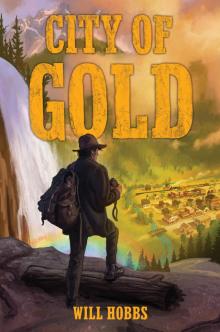 City of Gold
City of Gold Kokopelli's Flute
Kokopelli's Flute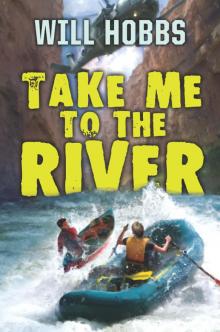 Take Me to the River
Take Me to the River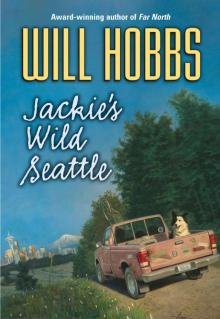 Jackie's Wild Seattle
Jackie's Wild Seattle The Maze
The Maze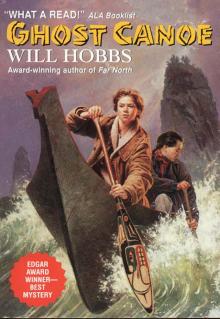 Ghost Canoe
Ghost Canoe Never Say Die
Never Say Die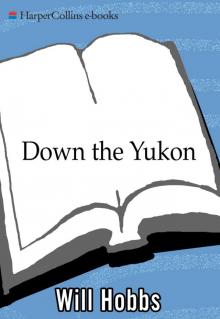 Down the Yukon
Down the Yukon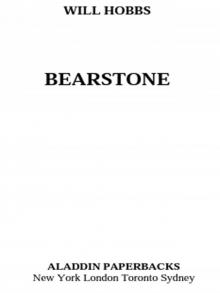 Bearstone
Bearstone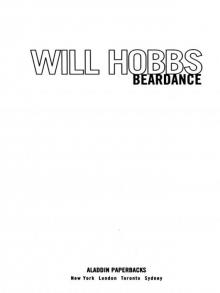 Beardance
Beardance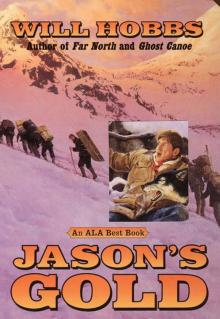 Jason's Gold
Jason's Gold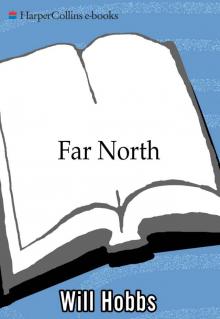 Far North
Far North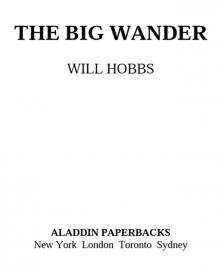 The Big Wander
The Big Wander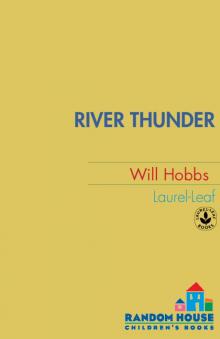 River Thunder
River Thunder Downriver
Downriver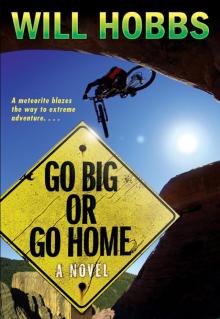 Go Big or Go Home
Go Big or Go Home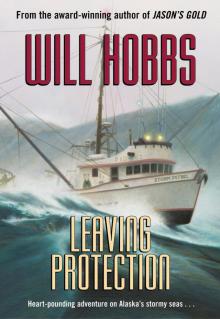 Leaving Protection
Leaving Protection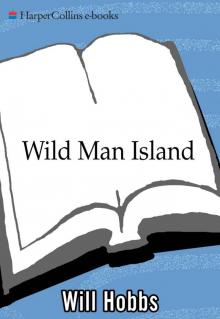 Wild Man Island
Wild Man Island